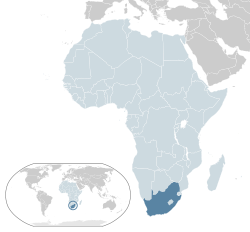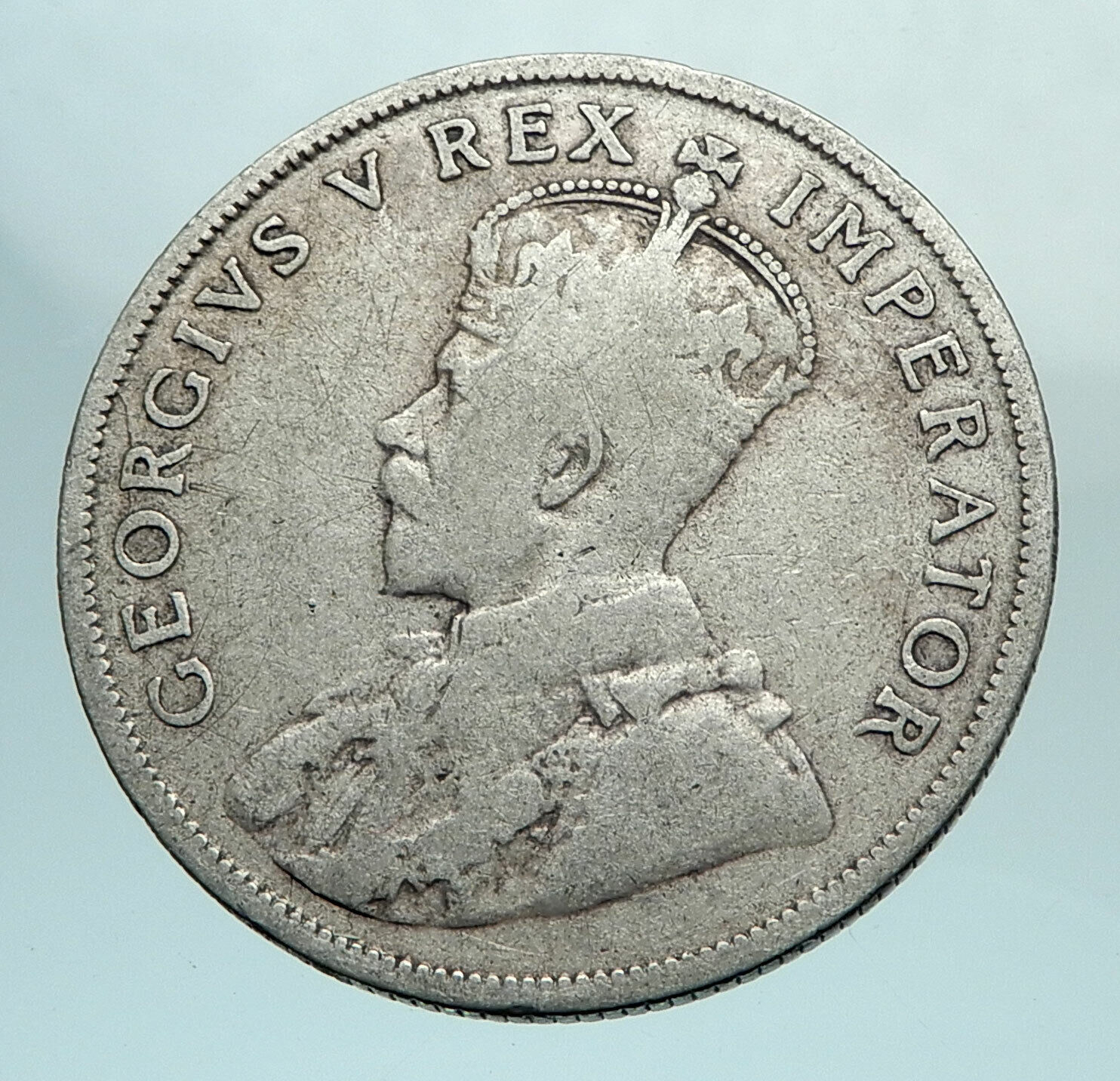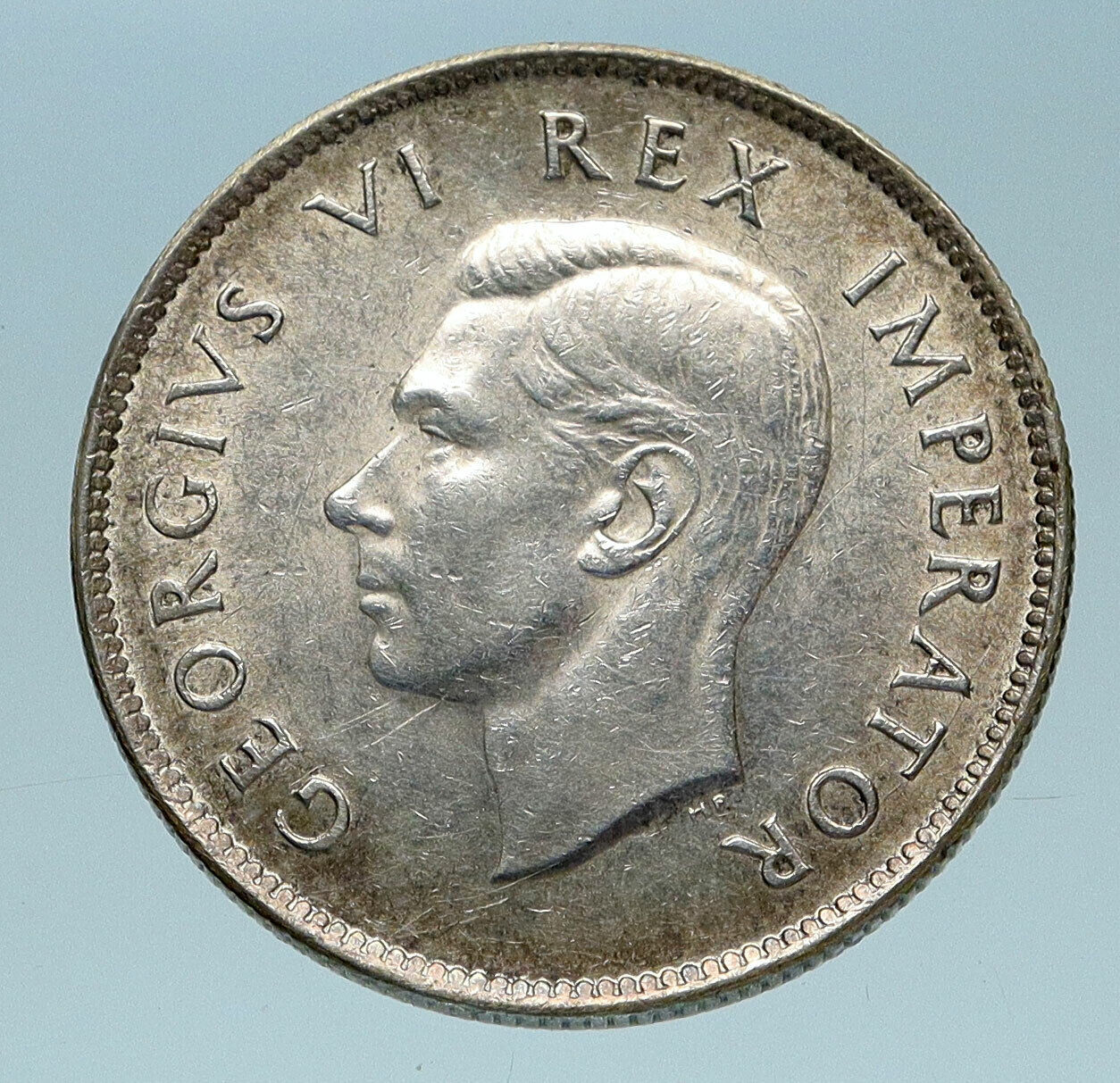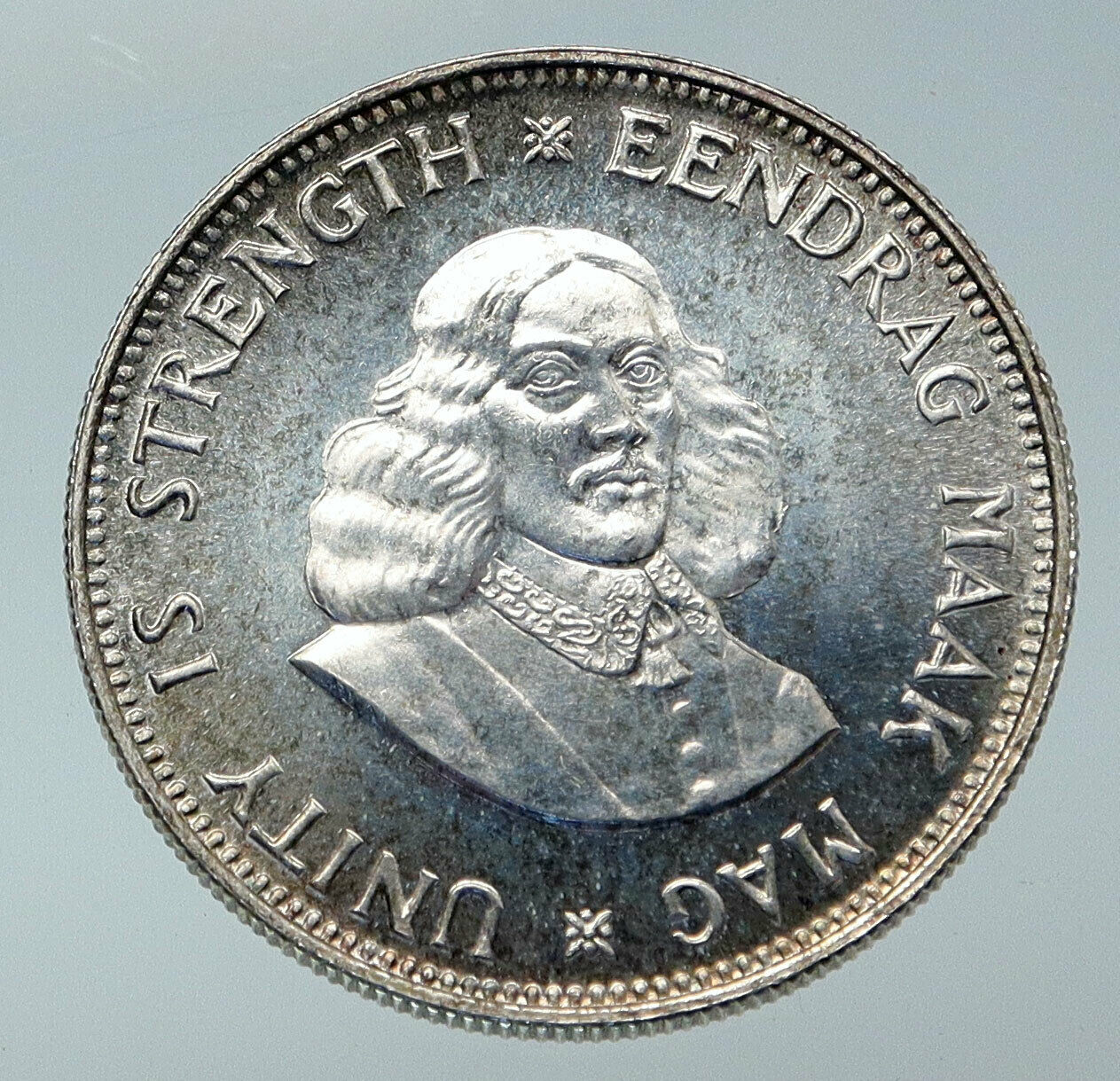|
South Africa – ruled by Elizabeth II – February 1952 – Present
1953 Silver 5 Shillings 38.8mm (28.20 grams) 0.500 Silver (0.4546 oz. ASW)
Reference: KM# 52
ELIZABETH II REGINA, Laureate head of Elizabeth II right.
SUID-AFRIKA 1953 SOUTH AFRICA 5 S around springbok.
You are bidding on the exact item pictured, provided with a Certificate of Authenticity and Lifetime Guarantee of Authenticity.
 Elizabeth II (Elizabeth Alexandra Mary; born 21 April 1926) is the Queen of 16 of the 53 member states in the Commonwealth of Nations . She is also Head of the Commonwealth and Supreme Governor of the Church of England . Elizabeth II (Elizabeth Alexandra Mary; born 21 April 1926) is the Queen of 16 of the 53 member states in the Commonwealth of Nations . She is also Head of the Commonwealth and Supreme Governor of the Church of England .
Upon her accession on 6 February 1952, Elizabeth became Head of the Commonwealth and queen regnant of seven independent Commonwealth countries: the United Kingdom , Canada , Australia , New Zealand , South Africa , Pakistan and Ceylon . Her coronation the following year was the first to be televised. From 1956 to 1992, the number of her realms varied as territories gained independence and some realms became republics. Today, in addition to the first four of the aforementioned countries, Elizabeth is Queen of Jamaica , Barbados , the Bahamas , Grenada , Papua New Guinea , Solomon Islands , Tuvalu , Saint Lucia , Saint Vincent and the Grenadines , Belize , Antigua and Barbuda , and Saint Kitts and Nevis . She is the longest-lived and, after her great-great grandmother Queen Victoria , the second longest-reigning British monarch.
Elizabeth was born in London and educated privately at home. Her father acceded to the throne as George VI on the abdication of his brother Edward VIII in 1936, from which time she was the heir presumptive . She began to undertake public duties during the Second World War , in which she served in the Auxiliary Territorial Service . In 1947, she married Prince Philip, Duke of Edinburgh , with whom she has four children: Charles , Anne , Andrew , and Edward .
Elizabeth’s many historic visits and meetings include a state visit to the Republic of Ireland , the first state visit of an Irish president to the United Kingdom , and reciprocal visits to and from the Pope. She has seen major constitutional changes, such as devolution in the United Kingdom , Canadian patriation , and the decolonization of Africa . She has also reigned through various wars and conflicts involving many of her realms.
Times of personal significance have included the births and marriages of her children and grandchildren, the investiture of the Prince of Wales , and the celebration of milestones such as her Silver , Golden , and Diamond Jubilees in 1977, 2002, and 2012, respectively. Moments of sorrow for her include the death of her father, aged 56, the assassination of Prince Philip’s uncle, Lord Mountbatten , the breakdown of her children’s marriages in 1992 (a year deemed her annus horribilis ), the death in 1997 of her son’s former wife, Diana, Princess of Wales , and the deaths of her mother and sister in 2002. Elizabeth has occasionally faced republican sentiments and severe press criticism of the royal family , but support for the monarchy and her personal popularity remain high.
 South Africa, officially the Republic of South Africa (RSA), is the southernmost country in Africa. It is bounded on the south by 2,798 kilometres (1,739 mi) of coastline of Southern Africa stretching along the South Atlantic and Indian Oceans; on the north by the neighbouring countries of Namibia, Botswana, and Zimbabwe; and on the east and northeast by Mozambique and Swaziland; and surrounds the kingdom of Lesotho. South Africa is the 25th-largest country in the world by land area, and with close to 56 million people, is the world’s 24th-most populous nation. It is the southernmost country on the mainland of the Old World or the Eastern Hemisphere. About 80 percent of South Africans are of Sub-Saharan African ancestry, divided among a variety of ethnic groups speaking different Bantu languages, nine of which have official status. The remaining population consists of Africa’s largest communities of European (white), Asian (Indian), and multiracial (coloured) ancestry. South Africa, officially the Republic of South Africa (RSA), is the southernmost country in Africa. It is bounded on the south by 2,798 kilometres (1,739 mi) of coastline of Southern Africa stretching along the South Atlantic and Indian Oceans; on the north by the neighbouring countries of Namibia, Botswana, and Zimbabwe; and on the east and northeast by Mozambique and Swaziland; and surrounds the kingdom of Lesotho. South Africa is the 25th-largest country in the world by land area, and with close to 56 million people, is the world’s 24th-most populous nation. It is the southernmost country on the mainland of the Old World or the Eastern Hemisphere. About 80 percent of South Africans are of Sub-Saharan African ancestry, divided among a variety of ethnic groups speaking different Bantu languages, nine of which have official status. The remaining population consists of Africa’s largest communities of European (white), Asian (Indian), and multiracial (coloured) ancestry.
South Africa is a multiethnic society encompassing a wide variety of cultures, languages, and religions. Its pluralistic makeup is reflected in the constitution’s recognition of 11 official languages, which is among the highest number of any country in the world. Two of these languages are of European origin: Afrikaans developed from Dutch and serves as the first language of most white and coloured South Africans; English reflects the legacy of British colonialism, and is commonly used in public and commercial life, though it is fourth-ranked as a spoken first language. The country is one of the few in Africa never to have had a coup d’état, and regular elections have been held for almost a century. However, the vast majority of black South Africans were not enfranchised until 1994. During the 20th century, the black majority sought to recover its rights from the dominant white minority, with this struggle playing a large role in the country’s recent history and politics. The National Party imposed apartheid in 1948, institutionalising previous racial segregation. After a long and sometimes violent struggle by the African National Congress and other anti-apartheid activists both inside and outside the country, discriminatory laws began to be repealed or abolished from 1990 onwards.
Since 1994, all ethnic and linguistic groups have held political representation in the country’s democracy, which comprises a parliamentary republic and nine provinces. South Africa is often referred to as the “Rainbow nation” to describe the country’s multicultural diversity, especially in the wake of apartheid. The World Bank classifies South Africa as an upper-middle-income economy, and a newly industrialised country. Its economy is the second-largest in Africa, and the 34th-largest in the world. In terms of purchasing power parity, South Africa has the seventh-highest per capita income in Africa. However, poverty and inequality remain widespread, with about a quarter of the population unemployed and living on less than US$1.25 a day. Nevertheless, South Africa has been identified as a middle power in international affairs, and maintains significant regional influence.
|





 Elizabeth II (Elizabeth Alexandra Mary; born 21 April 1926) is the Queen of 16 of the 53 member states in the Commonwealth of Nations . She is also Head of the Commonwealth and Supreme Governor of the Church of England .
Elizabeth II (Elizabeth Alexandra Mary; born 21 April 1926) is the Queen of 16 of the 53 member states in the Commonwealth of Nations . She is also Head of the Commonwealth and Supreme Governor of the Church of England . South Africa, officially the Republic of South Africa (RSA), is the southernmost country in Africa. It is bounded on the south by 2,798 kilometres (1,739 mi) of coastline of Southern Africa stretching along the South Atlantic and Indian Oceans; on the north by the neighbouring countries of Namibia, Botswana, and Zimbabwe; and on the east and northeast by Mozambique and Swaziland; and surrounds the kingdom of Lesotho. South Africa is the 25th-largest country in the world by land area, and with close to 56 million people, is the world’s 24th-most populous nation. It is the southernmost country on the mainland of the Old World or the Eastern Hemisphere. About 80 percent of South Africans are of Sub-Saharan African ancestry, divided among a variety of ethnic groups speaking different Bantu languages, nine of which have official status. The remaining population consists of Africa’s largest communities of European (white), Asian (Indian), and multiracial (coloured) ancestry.
South Africa, officially the Republic of South Africa (RSA), is the southernmost country in Africa. It is bounded on the south by 2,798 kilometres (1,739 mi) of coastline of Southern Africa stretching along the South Atlantic and Indian Oceans; on the north by the neighbouring countries of Namibia, Botswana, and Zimbabwe; and on the east and northeast by Mozambique and Swaziland; and surrounds the kingdom of Lesotho. South Africa is the 25th-largest country in the world by land area, and with close to 56 million people, is the world’s 24th-most populous nation. It is the southernmost country on the mainland of the Old World or the Eastern Hemisphere. About 80 percent of South Africans are of Sub-Saharan African ancestry, divided among a variety of ethnic groups speaking different Bantu languages, nine of which have official status. The remaining population consists of Africa’s largest communities of European (white), Asian (Indian), and multiracial (coloured) ancestry.




